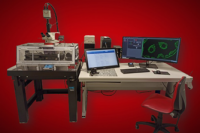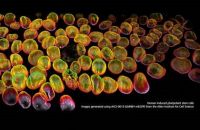News from our Core Facilities
NEW: Leica LMD7 - laser microdissection
Dear User of the Light Microscopy Core Facility,
We are pleased to unveil our latest addition: the Leica LMD7 laser microdissection system!
The Leica LMD7 is an advanced laser microdissection system designed for precise isolation of specific cells or tissue regions from complex biological samples. It employs a high-precision UV laser to cut and separate selected microscopic areas without physical contact, minimizing contamination or damage to the surrounding tissue. The cut-out regions are then collected via gravity into a collection device for downstream molecular analysis, such as genomics (DNA/RNA), proteomics, or metabolomics.
The LMD7 is located in room S1.111a in TP4. Please contact Mahsa Shakouri for more information or to arrange a training session.
Kind regards,
Your LMCF

Tech-Talk: The AVITI™Sequencer: Revolutionizing Multiomics: An Integrated Solution for Genomics, Transcriptomics, and Proteomics
––– Diese Veranstaltung findet in englischer Sprache statt. –––
Please be cordially invited to the upcoming Core Facility Tech-Talk:
The AVITI™Sequencer: Revolutionizing Multiomics:
An Integrated Solution for Genomics, Transcriptomics, and Proteomics
Monday, November 11, 2024, 11am
Seminar Room: Buchleither Room (TP3, INF 580, Ground Floor)
Speaker: Dr. Sebastian Celis
Field Application Scientist FAS, EMEA, Element Biosciences
In this presentation, we will introduce Element Biosciences' Avidity sequencing chemistry, which enhances accuracy by separating DNA template progression from nucleotide identification using multivalent nucleotide ligands that form stable avidites. This method improves base calling, even in challenging homopolymer sequences, by reducing nucleotide dissociation rates. We will also discuss the AVITI24 platform, which integrates multiomic read-outs—including cellular morphology, RNA, and protein expression—from a single sample. Finally, we will showcase the Trinity enrichment solution, which simplifies targeted sequencing, offering users enhanced convenience and flexibility in experimental design.
Dr. Sebastian Celis
He is a Senior Field Application Scientist at Element Biosciences, with a Ph.D. in Animal Ecology and Systematics from Justus Liebig University Giessen, where he specialized in coral holobiont research using NGS and whole metagenome sequencing.
No registration required. You may forward this seminar announcement to any interested colleague.
We would be very pleased to welcome you at our seminar!
With kind regards,
Lena Krämer
On behalf of the NGS Core Facility
Tech-Talk: The 6-base genome reveals novel biomarkers and gene regulatory mechanisms
––– Diese Veranstaltung findet in englischer Sprache statt. –––
Please be cordially invited to the upcoming Core Facility Tech-Talk :
The 6-base genome reveals novel biomarkers and gene regulatory mechanisms
Monday, October 21, 2024, 11am
Seminar Room: Buchleither Room (TP3, INF 580, Ground Floor)
Speaker: Tom Charlesworth
Director, Market Strategy and Corporate Development, biomodal
Introducing the 6-base genome
Tom will introduce the 6-base genome (A, T, C, G, 5mC, and 5hmC) delivered by a powerful new technology, duet evoC. The talk will focus on data demonstrating how the 6-base genome can improve biomarker detection, provide insight into regulatory dynamics and be used to predict gene expression and chromatin accessibility.
Tom Charlesworth
A biochemist by training, Tom leads the product management team at biomodal. This allows him to understand the technical aspects of duet evoC and the scientific questions the 6-base genome can unlock.
No registration required. You may forward this seminar announcement to any interested colleague.
We would be very pleased to welcome you at our seminar!
Download poster here.
With kind regards,
Lena Krämer
On behalf of the NGS Core Facility
Announcement: CFFC Public RocketChat channel
Dear Cytometry users,
In May 2024 we have established a public, DKFZ-internal RocketChat-channel to get easier and faster in touch with you.
What do we offer in our RocketChat channel?
• Give you announcements in case of (unscheduled) staff shortages (vacation, sickness, etc.)
• Communicate Instrument maintenance and downtimes
• General announcements for changes in the core facility, Seminars, TechTalks and Workshops
• Share Knowledge with you
• Share information about background developments (e.g. custom build tube holders, change of java backend for DIVA due to license issues)
What can you do in our RocketChat channel?
• Get in touch with us via #FlowCytometry-User-Chat
• Ask Questions (even after office hours, or if you can´t reach us in the office*)
• Discuss with other CFFC users
*During weekends, holidays, vacations we cannot guarantee to answer questions, but we try as good as possible. During longer vacations (e.g. christmas holidays) we will announce a schedule for an "end -of-the-year" online support)
Where can you find our RocketChat channel?
Follow this link: https://chat.dkfz.de/channel/FlowCytometry-User-Chat
#FlowCytometry-User-Chat
Where do you get support for RocketChat?
IT Service: https://intracoop.dkfz-heidelberg.de/sites/flow-cytometry/OI%20General/OI_W220_RocketChat.pdf
We would be glad, if you join our channel to make communication easier with you and to offer better and faster online support!
Kind regards
Your Flow Team
#FlowCytometry-User-Chat
Long-Term Lattice Lightsheet 7 Demo Installation in the Light Microscopy Core Facility (LMCF)
Lightsheet microscopy enables gentle fluorescence imaging as only the focal plane is illuminated, reducing photobleaching and phototoxic effects in the sample. Further developed by Eric Betzig in 2014, the so-called 'lattice lightsheet' overcomes the problem of conventional lightsheet systems, which are limited by light diffraction, and thus enables clearer subcellular resolution. The ZEISS Lattice Lightsheet 7 (LLS7) improves on Betzig's design with an inverted set-up suitable for standard cell culture vessels. It enables gentle long-term and high-speed fluorescence imaging (up to 3 volumes/s) with subcellular resolution under physiological conditions. The system offers near isotropic resolution in lateral and axial direction and improves 3D visualisation and quantification.
The demo installation of the ZEISS LLS7 will remain in the LMCF for a longer period of time. Please request a demo slot if you wish to attend a hands-on session and test your own samples: lichtmikroskopie@dkfz-heidelberg.de


NEW CORE FACILITY TECH-TALK by the Microarray Core Facility
Precision Genotyping for EGFR Mutation-Positive NSCL-Cancer Using Multiplexed Digital PCR on cell-free DNA (cfDNA)
Monday, July 1, 2024, 11am
Seminar Room: Buchleither Room (TP3, INF 580, Ground Floor)
Speaker: Dr. Katharina Sollweck
Senior Product Specialist digital PCR, Thermo Fisher Scientific
Epidermal growth factor receptor (EGFR) mutations can be drivers of cancer and cause resistance to treatments in patients with non-small cell lung cancer (NSCLC), the leading cause of cancer-related death in the US. Identifying EGFR mutations in patient cell-free DNA (cfDNA) may enable researchers to detect cancer early, measure therapeutic response, quantify residual tumor burden, and monitor emerging resistance to potential therapies. Here, we present three multiplex EGFR mutation panels compatible with cfDNA for use on the Applied Biosystems QuantStudio Absolute Q digital PCR (dPCR) system. The panels target known driver, drug resistance, and low frequency mutations, respectively. We demonstrate that the three EGFR mutation panels can detect multiple mutations in the same reaction with high sensitivity (0.01% allele frequency, AF), thus enabling liquid biopsy cancer research for early detection and monitoring, which is critical for understanding how a tumor may respond to potential treatment.
No registration required. You may forward this seminar announcement to any interested colleague.
We would be very pleased to welcome you at our seminar!
Download the poster HERE.
